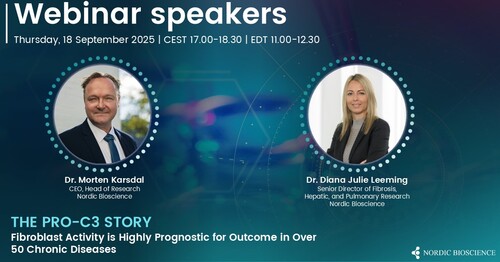The PRO-C3 Story | Webinar: Fibroblast Activity is Highly Prognostic for Outcome in Over 50 Chronic Diseases
Fibroblast activity is a major cause of 35% of deaths in the Western world. Fibroblasts are key drivers of outcome in solid tumors as well as in fibrosis of the liver, lung, kidney, intestine, skin, and in heart failure. We need to quantify and change fibroblast activity to alter the trajectory of organ failure and patient outcomes.
PRO-C3 is one such measure of fibroblast activity. PRO-C3 was launched by Roche in May 2025, with the context of use (COU) as a diagnostic enrichment tool for liver fibrosis. There are many lessons to be learned from this in biomarker discovery and development. We will discuss the process of how an ELISA kit was advanced through CLSI validation into an RPA prototype assay with Roche, moving to IVD quality on the flagship 801 equipment, gathering data for CE launch, while simultaneously submitting to the FDA for 1) a Letter of Intent, 2) qualification advice, and 3) a full qualification package under the LITMUS consortium. This work resulted in an FDA Letter of Support—the first ever for a serological biomarker for the assessment of tumor fibrosis. This is a story of the work of hundreds of researchers and remarkable teamwork that would not have been possible without extraordinary stamina.
This webinar is a celebration of the PRO-C3 story and all the people involved. We will highlight the best diagnostic, prognostic, and pharmacodynamic data, demonstrating how dangerous fibroblast activity is for patients, as well as the role of PRO-C3 in drug development across a range of indications where the extracellular matrix is a key component. From cellular mechanisms to serological assessment in patients—this is about how to quantify and control fibroblast activity.
Naturally, we will also discuss weight-dependent and weight-independent approaches to modulating fibroblast activity, and the challenges and opportunities that follow.
Read more
PRO-C3 is one such measure of fibroblast activity. PRO-C3 was launched by Roche in May 2025, with the context of use (COU) as a diagnostic enrichment tool for liver fibrosis. There are many lessons to be learned from this in biomarker discovery and development. We will discuss the process of how an ELISA kit was advanced through CLSI validation into an RPA prototype assay with Roche, moving to IVD quality on the flagship 801 equipment, gathering data for CE launch, while simultaneously submitting to the FDA for 1) a Letter of Intent, 2) qualification advice, and 3) a full qualification package under the LITMUS consortium. This work resulted in an FDA Letter of Support—the first ever for a serological biomarker for the assessment of tumor fibrosis. This is a story of the work of hundreds of researchers and remarkable teamwork that would not have been possible without extraordinary stamina.
This webinar is a celebration of the PRO-C3 story and all the people involved. We will highlight the best diagnostic, prognostic, and pharmacodynamic data, demonstrating how dangerous fibroblast activity is for patients, as well as the role of PRO-C3 in drug development across a range of indications where the extracellular matrix is a key component. From cellular mechanisms to serological assessment in patients—this is about how to quantify and control fibroblast activity.
Naturally, we will also discuss weight-dependent and weight-independent approaches to modulating fibroblast activity, and the challenges and opportunities that follow.
Read more
